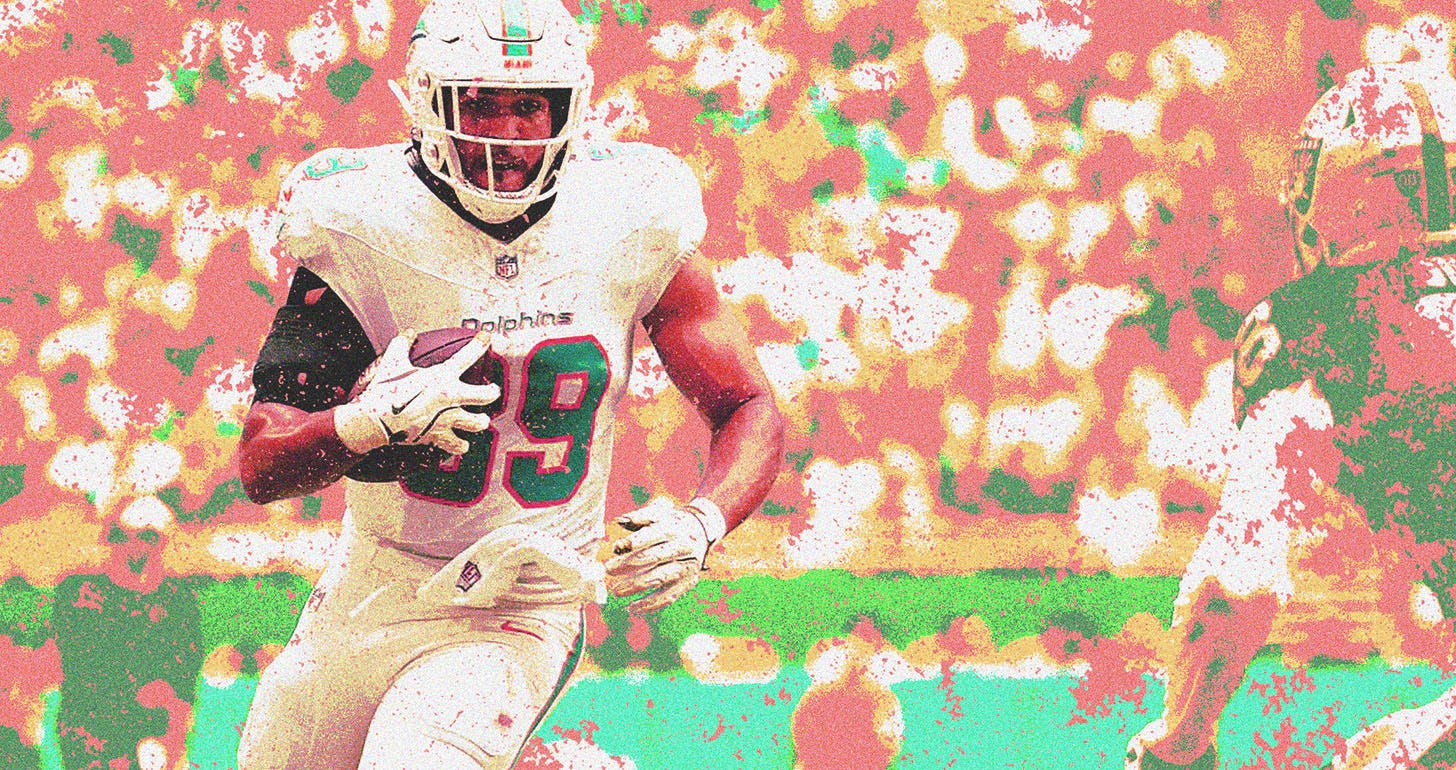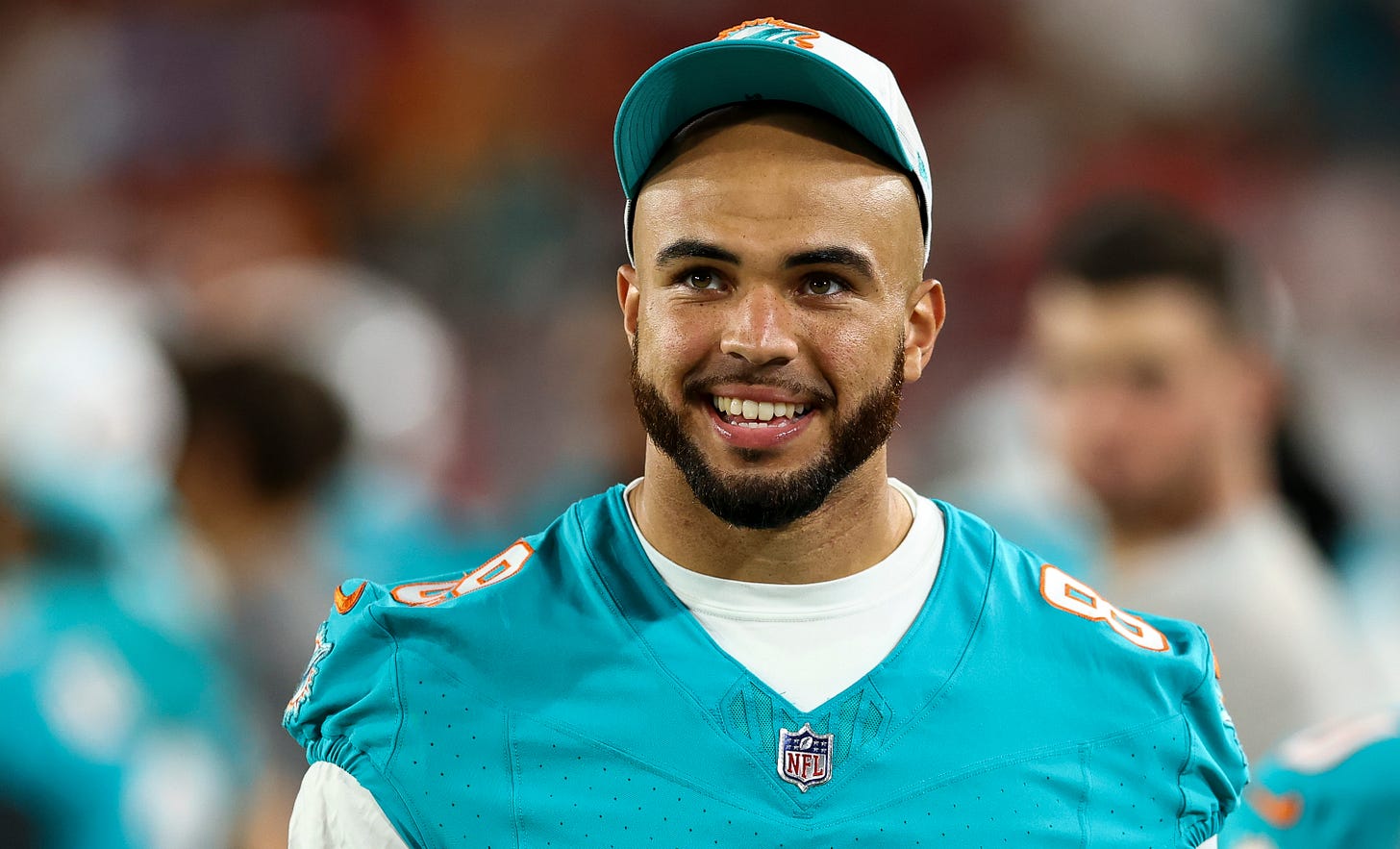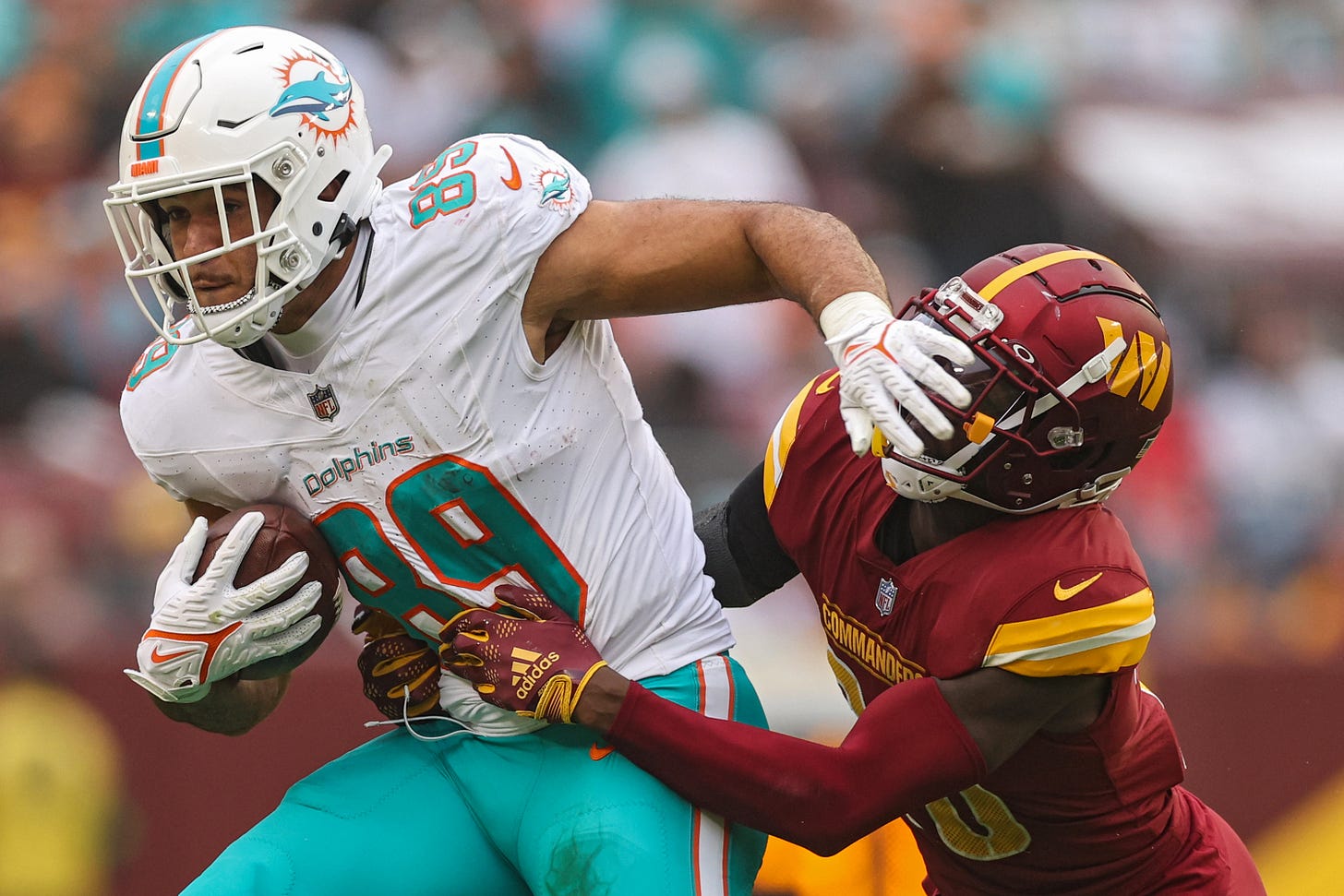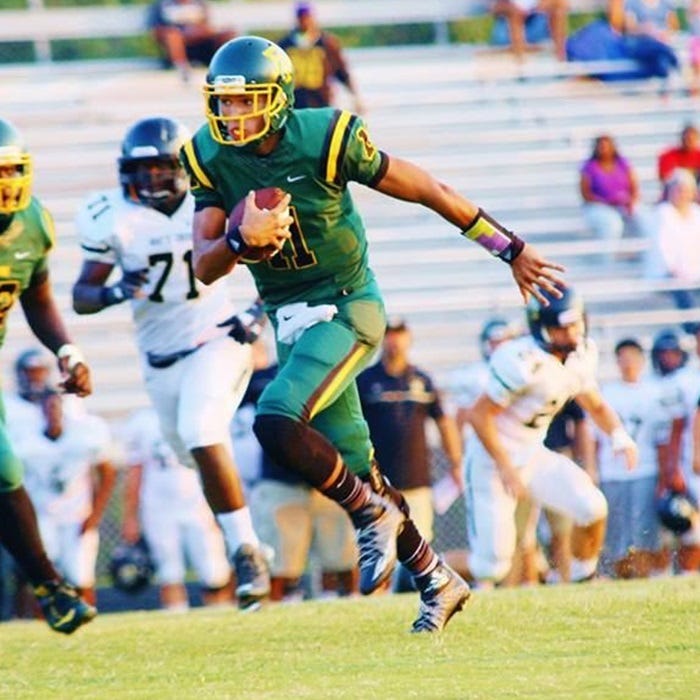Julian Hill will save lives, Part II: Rescued
He escaped homelessness. He picked up football. Finally, Julian Hill had what every 9-year-old needs: hope. And yet? This was also an entirely new world with new demons to slay. Our series continues.
Miss Part I? Read here:
MIAMI GARDENS, Fla. — Today, Julian Hill calls his adopted parents “Mom” and “Dad.” As these memories replay through his mind — from age 9 on — he beams. No baseball bats smashing windows. No bullets. No violence. These “flashes” of light are much more pleasant.
The day he discovered football.
The nights he shot free throws until he could barely see the basketball hoop in the pitch-black night.
Mostly, he thinks of the sacrifice both parents made.
When a homeless boy in Fayetteville, N.C. had absolutely nowhere else to go, Paul and Shannon Schaeffer opened up their home. In October 2009, both Julian and his biological mother moved in. The two women were friends back in high school and the Schaeffers wanted to help again. Problem was, the drug use continued. Julian’s biological mother could not quit and no way were Paul and Shannon allowing drugs inside their home. Paul set basic rules for her to follow and she objected.
By December, she was kicked out.
Initially? Julian felt trapped between two worlds. He’d pack a bag and spend a night with his biological mother inside of her Section 8 housing. At Miami Dolphins HQ, he pretends to grip a rope with each hand and sways back and forth. He could not completely quit seeing the woman he went into “battle” with through childhood. But he also couldn’t deny that she refused to get better. Bad characters were still passing through her doors. Drugs were still out in the open. One night was the final straw. With a 10-year-old Julian seated right there on the couch, the adults all passed a joint around. Smoke filled the air.
Here, a fleeting moment of anger passes through Hill — “at least go outside!” he laments.
Visits to his biological mother came to a close. Hill decided to throw himself into this entirely new world of structure, and it wasn’t easy. Paul and Shannon felt like total strangers to Hill. “Are these my people?” he asked himself. The transition was difficult. It took him several years to warm up to both. When they walked through Lowe’s or shopped for groceries, Hill trailed a full three paces behind. He didn’t tell Paul he loved him until he was a senior in high school and referred to Shannon as “Aunt Shannon.”
But as time passed, as he could analyze the situation with more clarity, justifiable anger crept in.
He wondered why his biological mother didn’t fight harder to change — for him.
To his core, Hill was craving structure.
He learned table manners and how to eat. (Hill had no clue.) He learned that it’s bad to lie. It could’ve been something as simple as denying that he ate the last Oreo. (“I was very deceitful. That’s how I grew up!”) He cut his afro off. He started doing chores around the house. On Saturday mornings, it was his job to pick the weeds from plants. Day to day, he witnessed how a man should treat a woman. With respect, with love. Seeing Paul work so much taught him work ethic. His adopted father would wake up at 5 a.m. every morning to get to his auto repair shop in Fayetteville by 7. He’s been fixing cars since he was 14 years old.
Paul and Shannon had a son and daughter already, but both had graduated high school.
For the first time — ever — Julian Hill built a true “foundation” for his life.
Instead of vanishing, he had a second chance.
Paul credits his wife for having “the biggest damn heart on earth” and praises Julian for being one of the best things that’s ever happened to them both.
“Here’s the thing, man,” Schaeffer says. “When you take somebody in, you have no idea what what he’s going to be like. Especially since I know the background. Julian ended up being just phenomenal. I never chased him down for anything. … He deserves it, man. Any kid deserves a chance. There’s no such thing as looking at the kid saying, ‘Oh, he’s useless.’ No. You can’t help people’s upbringing.”
Hill’s grades skyrocketed. Hill knew who to avoid because he witnessed how drugs ruin lives. Schaeffer still remembers Hill coming home from a day of pickup ball saying he cannot play with that particular crew ever again because those peers were on a one-way track to jail. Julian much preferred to spend his idle time in the pool. When Schaeffer adopted a boy who had seen things no boy ever should, he half-expected him to be rebellious, to push back against his rules. And thinking back, Schaeffer estimates he raised his voice once. Maybe twice. Hill never got in trouble at school. Even the lady working at the local rec center who saw Hill as much as anyone praised his behavior every single time Paul picked him up.
Then, he found football.
Go Long is your home for longform pro football coverage.
Thank you for supporting our independent journalism.
The extent of Hill’s sports career before Paul and Shannon adopted him was two weeks of tee ball at age 4. That’s it.
Nor did his new parents know much about football.
But Julian was a big kid. Julian had loads of energy. They figured it’d be good for him to play in the local 9/10U youth football league. Paperwork was filed and Julian was drafted by the “Trojans.” But in a weird twist fate, he reported to practice on the wrong day. As Shannon and Julian wandered around the field in search of their team, the coach of the “Panthers” spotted both… and sprang into action. Erwin Montgomery Sr., you see, was not thrilled with the results of the league’s draft. All of his players were “little bitty,” he jokes. Roughly “three-feet tall, 35 pounds” apiece.
During his team’s practice, he spotted this big kid who appeared lost and politely informed the mother that her son played for his team.
Shannon pushed back and said she was sure Julian had been drafted by the Trojans, and Montgomery insisted. No, no, no. He most certainly was a Panther.
And that was that. They relented. That night, Montgomery ordered Hill a uniform as cover. So when Hill never showed up for the Trojans? And the league manager approached him? Montgomery played dumb. Montgomery said he thought he had drafted Hill and — wouldn’t ya know? — he had already purchased Hill a uniform. The league relented.
Hill was the star of the team.
Hill got hooked on football.
This stroke of fortune also changed Hill’s life.
Montgomery — a former state trooper — is the one who taught him the sport. Those first few weeks, Hill sure was “clumsy,” the coach says. But the kid learned fast. He constantly asked questions. He wanted to know what all 11 players on the field were asked to do every play. Erwin Sr. played him at nearly every position: tight end, linebacker, defensive end, quarterback, tailback. And beyond the sport, Montgomery became a second father. He soon teased Julian that his last name should be “Montgomery-Hill” because he hung out at his house every weekend. His son, Erwin Jr., instantly became his best friend.
If the Schaeffers didn’t adopt him? Erwin Sr. says he would have in a heartbeat.
When he heard what Hill witnessed as a kid, it put tears in his eyes. To this day, it angers him that the biological mother would jeopardize her own child’s life to such an extreme. Those early days? He could tell Hill was abandoned growing up. He describes him as “wide eyed” — especially when he learned Erwin Sr. was a former Marine who worked for the North Carolina State Highway Patrol.
Once again, though, Hill gravitated toward authority as if yearning for the Dad he never had.
“I’d bark at him and my son all the time,” Montgomery says. “I didn’t give them a chance to breathe. So he went from seeing stuff and fending for himself to, now, somebody who’s caring — who really, really cares — and showing him, ‘don’t do this, don’t do that.’ And I made sure I rewarded them when they did something. Once he got in that environment, the new environment, he became very, very humble. He knew what he came from, to what he’s got now, and he was not going to lose it.”
Right down to each plate of food at night. One day, Montgomery’s wife bought a box of 30 sausages and Erwin Sr. chastised her for wasting food. Thirty? Really?! She cooked all 30 anyways… and a full 18-pack of eggs… and a full pot of grits with toast. The entire meal was set on the table, Montgomery slid outside briefly, and when he returned? Hill and his son ate it all. (This sure beat a Hot Pocket.)
Each weekend, he’d stress to Hill that giving anything less than 110 percent was a waste.
“And that’s the first person I know in my life that when you tell him something,” Montgomery says, “and once he gets in his mind that’s what he wants to do? He’s going to give you 120%.”
The man is an absolute character. His voice bellows. His stories are electric. The reason these two connected so effortlessly was that Erwin Montgomery Jr. saw himself in Julian Hill. He, too, rode the fine line between life and death growing up. He, too, has scars that’ll last forever. Whenever friends tell Montgomery he got his PTSD from his military days, he corrects them. Nope. He simply grew up on the east side of downtown Detroit.
One day, he and his friend were approached by a man who demanded their shoes. Erwin Sr. handed his over. His friend refused. His friend was shot dead in the head..
Never affiliated himself, Montgomery lived on the border of three rival gangs and made nice with all three to avoid being killed. A tightrope act that backfired one day. When all three groups converged for a massive gang fight at his corner, Montgomery was stuck in limbo. “Get over here!” one gang member yelled. “Hey man, over here with us!” another shouted. His eyes darted from one group to the next. The gangs couldn’t understand why he wasn’t picking a side and — in a state of panic — everybody took off running. The most terrified of all was Montgomery. He locked himself inside his home for several weeks in fear of someone murdering him in retaliation.
Looking out of his dining-room window felt like “watching TV.” He witnessed drive-by shootings and full-fledged riots. Once, 100 police officers were called in.
Even work at KFC came with its hazards. He hated throwing the trash away because the dumpster was home to mutant rats that were large as cats. Once, a rat leapt onto his friend and sunk its teeth into his chest. Erwin wailed away with his mop — Whap! Whap! Whap! — until the rat’s teeth finally dislodged. Albeit, with a chunk of skin off his friend’s chest. (To date, he’s deathly afraid of rats.)
Then, there’s the time he found a baby in his basement. Seriously.
Nobody even knew his sister was pregnant. Somehow, she hid it from everybody. When she cut the cord herself and thought the baby was dead? She panicked, hid him in the basement, headed to the hospital. Of course, doctors could tell she had given birth and demanded answers. Otherwise, they’d need to get the authorities involved. Erwin and his sister walked into the basement, Erwin pulled the blanket away and he didn’t believe this was a real baby. He thought it was a doll.
“He opened his eyes, looked at me and smiled. Didn’t cry or nothing. I took off. It scared me.”
Fifty years later, that nephew is still alive.
Yes, Erwin Sr. could relate to Julian.
Naturally, Julian Hill gravitated toward the quarterback position. He wanted to lead. Early as middle school, Paul told him that people looked up to the quarterback. He had a responsibility. If anyone approached him after a game? Take the time to chat. “Talk to anybody that talks to you,” he told Julian. “Don’t shun them. Be nice to him, man. Don’t be that peckerhead who says ‘whatever’ and keeps walking.” Words that stuck with him. If anyone gave Julian their valuable time, he vowed to return the favor. He loved basketball, too. Julian recalls shooting “100, 200, 300, 400, 500” free throws in a row in the family’s driveway. By 8 p.m., Shannon had no choice but to call him in for dinner.
His adopted parents never pushed him to work this hard. It was all intrinsic.
Good thing because he wasn’t in the clear yet. Life would get harder.
At Pine Forest High School, Hill took over as the starting quarterback at the end of his freshman year. Head coach Bill Sochovka had been keeping an eye on Hill since those youth days. His offensive coordinator didn’t think Hill would amount to much as a QB, but Sochovka identified those leadership traits early. He knew this player needed to have the ball in his hands more than anybody else. Almost immediately as the starting man, Hill was bringing his own notebook into the film room to dissect his game with a critical eye.
Whenever Sochovka dropped the team’s film onto Hudl around 1 a.m., he could tell that most fast-forwarded to their highlights and skipped past the lowlights.
“Not Julian,” Sochovka says. “Julian was like, ‘I noticed on Clip 11 I did this, but I need to do better.’ And that’s very rare to find the high school kid — especially as a sophomore. Every kid wants to hear about how good they do, but he was asking the question: ‘How could I get better?’ And that’s something special.”
He had a strong arm. He was poised in the pocket. His greatest strength was knowing the playbook like the back of his hand. Hill would tell everyone where to line up before the snap and got into the habit of recommending play calls to the sideline.
Against E.E. Smith, he had a breakthrough performance in throwing for 147 yards with three total TDs.
Everything was peaking beautifully… until the next week, until the final game of his sophomore year.
In a driving rain against Jack Britt, Hill changed the play. He didn’t think he’d be able to handle the ball and effectively run the QB sneak from under center in such conditions. So, he lined up in shotgun and tried to diagonally dash toward the pylon with a head of steam. That’s where he got popped by a defender and felt indescribable pain in his knee. It was an out-of-body experience, “a movie type of deal,” he says. Face down, through the rain, he started to army crawl. Hill reached his hand out toward an ankle and that defender kicked it away.
Teammates helped him up, carried him off the field and the diagnosis was a torn ACL.
“I’ve been affected in my early years with things emotionally and mentally,” Hill says. “Now I’m getting affected physically. I can’t do something that I’ve been doing I love. It’s taken from me.”
Rehab was treacherous. He couldn’t help but mope around the house in self-pity — Paul was not having it. “Dude, what the hell’s wrong with you?” he asked him one day in his southern drawl. Hill sounded helpless. Hill said he didn’t know what to do now. “What have you been training for since you were 10 years old?” Paul asked. When Hill said he wanted to play in the NFL, his father responded: “Well, there you go, man. Go for it.”
With that tough love, Hill snapped out of his funk. He worked his way back and — as a junior at Pine Forest — emerged as one of the best passers in Cumberland County with 1,642 yards and 17 touchdowns. He started generating very real college football buzz… until the final game of that season, until it happened again. Even with a brace on, he tore the same ACL in Pine Forest’s final game. Hill had film galore available for colleges, but none of it mattered now.
All schools that had expressed interest sprinted 100 MPH the opposite direction. East Carolina, Old Dominion, everyone. One day at school, on crutches, he hobbled into the gymnasium and a kid on the basketball team couldn’t help himself. “Man, you got hurt again?” Hill recalls him saying. “The best you’re ever going to do now is D-II. That’s it, man! That’s all you got now!” There wasn’t much Hill could say. If anything, that twit was being kind because even local D-II schools such as Fayetteville State and UNC-Pembroke were backing off.
This time, the doctor recommended Hill take a full 12 months to rehab. There would be no football his 12th grade year. The NFL dream was all but dead.
“So you can imagine there was nobody,” Hill says. “Nobody.”
Adds Sochovka: “They dropped him like a hot iron.”
A crushing blow that could’ve broken Julian Hill’s soul for good.
Hell, it’s hard enough for any talent in Fayetteville to escape. At one point in our conversation, we both rave about the speed and athleticism and raw talent this pocket of North Carolina breeds. Ironically enough, my first full-time job after college was at the Fayetteville Observer, right when Hill had moved in with Paul and Shannon. The talent here rivals anything you’ll find in H.S. football hotbeds across the nation. Unfortunately, poverty and crime and a general lack of parental direction prevent that talent from going D-I. Considering he’s the coach who was around so many of these kids in their youth, Montgomery has the best vantage point. He’s seen promising 11- and 12- and 13-year-olds break bad more times than he can count.
“All you can do is shake your head,” Montgomery says. “They come out to play rec ball, basketball, whatever. You ask ‘Where are your parents at?’ and they say, ‘My grandmother, she brought me out here.’ You find out that the parents — the father and the mother — are in jail. And then the grandmothers can’t keep up with ‘em.”
Look no further than Hill’s own team at Pine Forest.
Willis Anthony, a star running back, was accused of shooting a man in the face during the 2016 season.
Lavonte Carter, the star running back in 2017, stayed in town to play at Fayetteville State University, started hanging around the drug crowd and nearly lost his life. One night on campus, he was shot nine times — including once in the head — and was arrested himself on charges of intent to sell cocaine and bringing a gun to educational property. The 9-1-1 call is haunting. Carter begs for his life.
Long before his peers, Hill permanently ditched this dangerous layer of Fayetteville, a.k.a. “Fayettenam” for the crime and local military base.
He saw his biological mother falling asleep at the steering wheel and knew he’d never touch drugs.
Yet even after avoiding all those pitfalls — after everything — he was now deemed damaged goods by college recruiters.
“In my life,” Hill says, “I was always going against something. I was always going against some type of odds. It was rough, man. It was tough. Those college coaches want them cats who are clean and pristine and don’t have any bruised bones on them. But that wasn’t my story.”
It would’ve been easy to contract Senioritis and forget football altogether that 2017 season. Move on.
Instead, Hill continued attending every single practice that fall. He didn’t play one down on Friday nights, but there was Hill in the scorching August heat. The monsoons. The sleet. The November cold. Inside the weight room. Inside the film room. That’s why Sochovka praises him as the most positive force he’s been around in his 30 years of coaching. Hill’s mere presence set the tone for the entire team. He’s had many kids from broken homes but — with Hill? — you’d never know. He never uttered a word about his harrowing childhood.
Nowadays, when Sochovka describes a player as “like a Julian Hill,” everyone in the building knows exactly what he means.
There were gut-check moments back home. At 3 a.m. in the morning, his knee would throb and Shannon would wake up to ice it for him. (“It’s hurting, man. I can’t feel it. And she’s falling asleep.”) Finally, he started referring to “Aunt Shannon” as Mom. Meanwhile, Paul loved ribbing Julian. He’d tell him it really sucked to pick him up from practice every day when he couldn’t even watch him on Fridays. Finally, Julian started referring to Paul as Dad. There hasn’t been one day that Hill has even contemplated finding his biological father. (“I’ve got a great father in my life right now.”)
Hill has zero clue where he’d be without the Schaeffers and Montgomery and everyone who embraced him. Lost somewhere in Fayetteville. Certainly not in the NFL, not involved in sports at all. Why exactly did they take him in? Hill takes a deep breath and stares ahead to ponder the decision that changed his life.
“The honest answer? They’re great people,” Hill says. “That’s the only reason I can give you. Deep in their hearts, that’s who they are. They saw somebody who needed help and they were willing to take that big step. A lot of people are not willing to do that.
“I would never be where I’m at today if they didn’t come into my life.”
By this point, Julian Hill was built to handle anything. Two ACLs? Pshh. He didn’t care if colleges were crossing his name off their list. Someone would believe. All he needed was one opportunity. His high school football career might’ve been over, but Hill rehabbed in time to play basketball that senior year at Pine Forest.
All he needed was a chance to compete.
That’s when another person entered his life and Julian Hill inched a little closer toward his life destiny.






